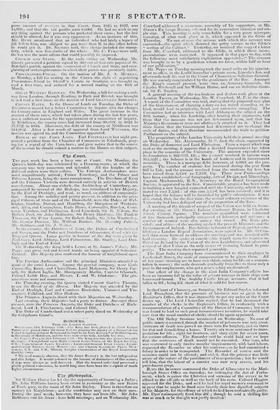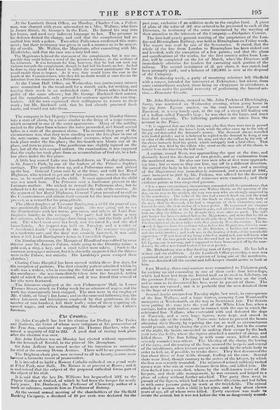In the Court of Chancery, on Saturday, Sir Edward Sugden
informed Lord Brougham, that the pressure of business was so great in the Registrar's Office, that it was impossible to get any order of the Court drawn up. The Lord Chancellor replied, that he had decreased the number of the clerks in the Registrar's Office, in conformity with a recommendation of a Committee of the Hoese of Commons; but as it was found to lead to sled' great inconvenience to suitors, he would take care that the usual number of clerks should be again appointed.
The Old Bailey Sessions terminated on Wednesday. No case of public interest occurred, though the number of prisoners was very great. Sentence of death was passed on three men for burglary, and on three for riot and demolishing a house. Twenty-six were sentenced to trans- portation for life ; eight for fourteen, and sixty-eight for seven years, for various offences. The Recorder said lie could hold out no hope that the sentences of death would not be executed. One man, who was sentenced to only twelve months' imprisonment, with hard labour, requested the Recorder to alter his sentence—as he had committed a felony in order to be transported. The Recorder of course said the sentence could not be altered ; and added, that the prisoner was little aware of the nature of the punishment of transportation ; but he would tell him, that the labour of a convict was now very severe, and his punishment great. Byers the informer summoned the Duke of Gloucester to the Marl- borough Street Office on Saturday, for infringing the Act of Parlia- ment, which requires the Christian and surname of the owner to he affixed to the off-side as well as the back of his carts. Colonel Higgins appeared for the Duke, and said he bad his royal master's coma-laud to re west that he might be fined more heavily than less dignified subjects of his Majesty, for the offence of which Ito bed been undoubtedly guilty. Mr. Dyer consequently fined him -201. ; though he said a shilling tine was as much as he thceight was j totly reletited!
At the Lambeth Street Office, on Monday, Charles Cox, a Police- man, was charged with gross misconduct to a Mrs. Wallace, who lives in James Street, St. George's in the East. He forced his way into her house, and used very indecent language to her. The prisoner in his defence denied the charge, and said that the complainant bad as- saulted him with a poker. Two other Policemen confirmed this state- ment; but their testimony was given in such a manner as to be unwor- thy of credit. Mr. Walker, the Magistrate, after consulting with 31r. Hardwicke, said that the case was a very bad one.
The Magistrates believed the statement of the complainant, but it was im- possible they could believe a word of the prisoner's defence, or the evidence of his witnesses. It Was fortunate for him, however, that he had not used any violence towards the complainant, though be had laid his hands on her : for had he done so, they would feel bound to inflict the severest punishment the law would enable them to impose. As it was, they would leave the case in the hands of the C lllll missioners, who they felt no doubt would at owe dismiss the defendant from his situation as a Policeman.
At the Union Hull Office, on Wednesday, two journeymen tanners were committed to the tread-mill for a month each, for striking, and leaving their work in an unfinished state. Fifteen others had been guilty of the same offence; but Mr. George Bucknell their master, and the complainant, only pressed for sentence against the two ring- leaders. All the men expressed their willingness to return to their work ; but Mr. Bucknell said, that lie had already procured fresh hands, and would not take them.

















 Previous page
Previous page